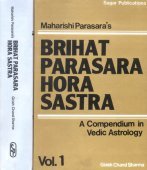Vedic Knowledge: 3 definitions
Introduction:
Vedic Knowledge means something in Hinduism, Sanskrit. If you want to know the exact meaning, history, etymology or English translation of this term then check out the descriptions on this page. Add your comment or reference to a book if you want to contribute to this summary article.
In Hinduism
Vaishnavism (Vaishava dharma)
Source: archive.org: The Tree Of Vedic Literature CoursesVedas are apauruseya, which means they are not compilations of human knowledge. Vedic knowledge comes from the spiritual world, from Lord Krishna, the Supreme Personality of Godhead. In the beginning the first living creature was Brahma. He received the Vedic knowledge from Krishna. Vedas are compared to desire tree because they contain all things knowable by man. They deal with mundane necessities as well as spiritual realization. Above and beyond all departments of knowledge there are specific directions for spiritual realization.

Vaishnava (वैष्णव, vaiṣṇava) or vaishnavism (vaiṣṇavism) represents a tradition of Hinduism worshipping Vishnu as the supreme Lord. Similar to the Shaktism and Shaivism traditions, Vaishnavism also developed as an individual movement, famous for its exposition of the dashavatara (‘ten avatars of Vishnu’).
General definition (in Hinduism)
Source: archive.org: Sri IsopanisadHe received this Vedic knowledge and imparted it to Nārada and other disciples and sons, and they also distributed it to their disciples. In this way, the Vedic knowledge comes down by disciplic succession. It is also confirmed in the Bhagavad-gītā that Vedic knowledge is understood in this way.
Source: archive.org: Bulletin of the Ramakrishna Mission Institute of CultureVedic knowledge is the direct awareness of consciousness associated with oneself and with every object etc. of the world. And hence the shadowy knowledge of the physical world, which does not include the awareness of consciousness, is not considered as even elementary knowledge in the ocean of supersensuous knowledge called the Vedas.
See also (Relevant definitions)
Partial matches: Knowledge, Veda.
Full-text: Vedanta, Paroksha, Brahma, Mahavada, Yuktashva, Pratyaksha, Karmakanda, Shrimad Bhagavatam, Jnanakanda, Mahabhuta, Satyayuga, Kashyapa, Tejorashi.
Relevant text
Search found 58 books and stories containing Vedic Knowledge; (plurals include: Vedic Knowledges). You can also click to the full overview containing English textual excerpts. Below are direct links for the most relevant articles:
Isha Upanishad (by A.C. Bhaktivedanta Swami Prabhupada)
Amarakoshodghatana of Kshirasvamin (study) (by A. Yamuna Devi)
Education (3): Knowledge < [Chapter 4 - Cultural Aspects]
Chaitanya Bhagavata (by Bhumipati Dāsa)
Verse 1.2.8 < [Chapter 2 - The Lord’s Appearance]
Verse 3.3.124-125 < [Chapter 3 - Mahāprabhu’s Deliverance of Sarvabhauma, Exhibition of His Six-armed Form, and Journey to Bengal]
Verse 1.14.116 < [Chapter 14 - The Lord’s Travel to East Bengal and the Disappearance of Lakṣmīpriyā]
Vedic influence on the Sun-worship in the Puranas (by Goswami Mitali)
Part 6 - Sūrya, the Ultimate Reality < [Chapter 4 - Vedic Influence on the Sun-Worship in the Purāṇas]
Mimamsa interpretation of Vedic Injunctions (Vidhi) (by Shreebas Debnath)
Chapter 11.1 - Means of Interpretation according to Uttaramīmāṃsā
Jnaneshwari (Bhavartha Dipika) (by Ramchandra Keshav Bhagwat)
Verse 9.17 < [Chapter 9 - Raja-vidya and Raja-guhya Yoga]
Verse 17.20 < [Chapter 17 - Shraddha-traya-vibhaga-yoga]
Verse 15.2 < [Chapter 15 - Purusottama-yoga]
Related products
